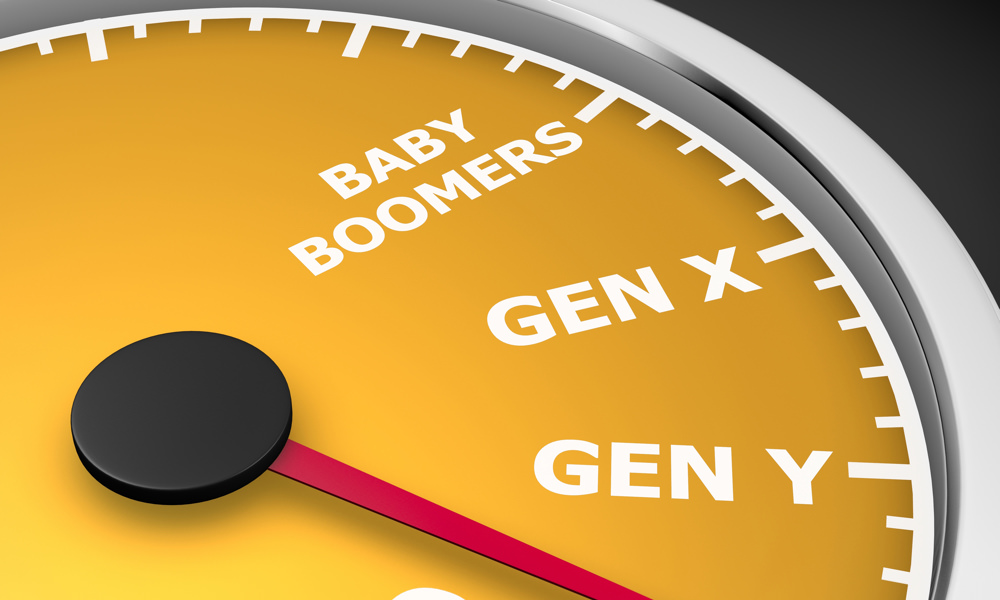What are the issues you face when coaching or mentoring different generations? As it turns out, when you born can really influence how you see the world. Teasing out the big questions, exploring how your individual coaching or mentoring can be more effective across the generations can build your general awareness and strengthen your skill base.

Picking your way through the intergenerational minefield
Baby-boomers. Digital natives. Generation X. Generation Y. Millennials. So many labels! So many ways of categorising people, of classifying the traits exhibited by groups, of stereotyping. As coaches we need to understand the mindset and cultural influences of each generation.
The theory of generations suggests people are significantly influenced by notable events from their youth. These shared experiences give rise to a feeling of collegiality and solidarity. This in turn creates a distinctive cohort of people who share a set of common characteristics, in other words a generation.
Are we defined by our cohort’s characteristics? Are we so deeply socialised by our culture that we function as a group, like a murmuration of starlings or a shoal of fish? Do our attitudes, life-choices, behaviours, and ways of relating to employers and potential employers embody unhelpful, unthinking assumptions and biases instilled by merely living through an event, through certain decades? Could the Korean War, Cuban Missile Crisis, Kennedy’s assassination, 9-11, the death of Diana or the first ever Harry Potter book really affect an entire generation that profoundly? It’s all open for discussion.

Gen Z, iGen, or Centennials are those born from 1996 and later – This cohort has had access to the internet since their early years, are comfortable with the technology and used to interacting on social media. Wikipedia gives you the full picture.
Millennials or Gen Y, those born between 1977 and 1995 – A piece of research in 2012 revealed Millennials as “more civically and politically disengaged, more focused on materialistic values, and less concerned about helping the larger community than were GenX”. Read more about the generation here.
Generation X, born between 1965 and 1976 – These people don’t anticipate retiring when their parents did. They appreciate a flexible work environment, own their own homes and make a high proportion of their purchases online. Find out more about Gen X here.
Baby Boomers, born between 1946 and 1964 – This generation tuned in, dropped out, got high, swung their way through the Sixties and became hippies in the Seventies. They’re also the first to be born into the welfare state. Find out more about them here.
Traditionalists or Silent Generation, born in 1945 and earlier – These people spent their lives fully expecting to be seen but not heard. They have a strong work ethic, are loyal, respect their bosses and see work as a privilege. You can find out the details here.
As you can see, a lot of this is generalisation. There are multiple ways to capture the truth, and just as many ways to miss vital points, to strain the gnat but end up swallowing the camel. So how do you use the generational model to your clients’ advantage and pick your way effectively through the intergenerational minefield?
Looking beyond generations labels to deeper implications
Under what circumstances do the generations work well together? Where do the tensions play out? How does intergenerational coaching and mentoring work for older coaches and mentors with younger clients and visa versa? As you know, in coaching and mentoring we need to move beyond our own realities to explore and appreciate other frames, other perspectives. Being curious and open to learning and exploring how others see the world is foundational to effective coaching and mentoring.
About us:
We create the space for leaders to step back, think clearly, and navigate complexity with confidence. By sharpening the narrative that drives decisions, teams, and performance, we help leaders move forward with clarity and impact. Our approach blends deep listening, incisive challenge, and commercial focus—strengthening leadership at every level, from business transformation to boardroom decisions.
“We share resources that help coaches deepen their practice and expand their impact. The articles on this site are designed to spark fresh thinking, offer practical tools, and support the continuous growth of coaches at every stage. “
Jude Elliman
Founder
Our Core Approach:
We work with leaders to sharpen their thinking, strengthen their leadership, and navigate complexity with confidence. Our approach is built around three core areas:
Narrative Coaching – Working with the stories that shape leadership, teams, and organisations.
Commercial Focus – Cutting through complexity to drive clear, strategic decisions.
Challenge & Space – Asking the right questions while creating the space to reflect and grow.
Through this, we help leaders drive transformation, align teams, and make high-stakes decisions with clarity and impact.
